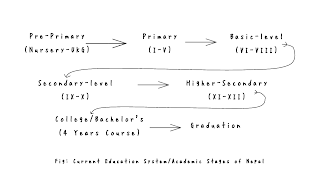There have been quite a lot of debates and arguments regarding the education system of Nepal. The education system which is prevalent in Nepal is quite similar to that of India. It is more focused on theoretical knowledge and literature rather than practical ones. The classes are less interactive and the academic institutions follow traditional methods of schooling. As a matter of fact, some of these methods are decades old and are still in practice in this modern world.
The Nepali education system has classified the academic sessions into three stages which is also popularly known as the 'Three-tier sixteen-year education system'. As per this system, one has to go through '10 years of the primary and secondary education system, followed by 2 years of higher-level education and 4 years of college-level studies 'bachelors'. Additionally, one can further pursue a master's education after graduating from college.
When we go back in time, the past of Nepal, the states and socio-economic conditions of Nepal were very bizarre; let alone the education system. There was no freedom of speech among people and slavery and capitalism were the most prominent practices there. However, the autocratic rulers of then - in an attempt/recognition to educate their heirs, established Durbar high school, the first school in Nepal. Later on, the school was made accessible to everyone and the nation started to program and revolution reforms started rolling across the nation.
In comparison to those times, only a little significant progress has occurred in the so-called 'Nepali Education System'. Unlike those times, everyone has got their independent choice, freedom of speech, democracy and law, and order in the nation, People no longer need to get the approval of higher-ups for basic to master level of study/education of their choice. Perhaps these factors, only a quarter or half of the population of Nepal are intermediate to highly educated. It's a serious issue considering the population of Nepal which is almost around 3 crore, and only a portion of it is educated.
It has only been a few decades or so, that women have got the right to education. Yes, I'm talking about the same country where women are worshiped and regarded as goddesses during festivals and events and the same country where women are deprived of basic facilities and considered inferiors to men. There used to be a misconception among people that, 'women are fit for household work and men are responsible for earning bread', which is unfortunately still prevalent in some rural areas of the nation.
Related: Why Are Doctors Handwritings So Hard To Understand? - I Think I Figured It Out
As per some surveys conducted by the government, only about 64% of the total population of Nepal is 'literate'. These surveys are quite old so the numbers might have increased over the years. Though the numbers of highly educated or ones who are pursuing higher education are low, the numbers are just the same or decreasing because a majority of them are shifting abroad. A recent report by the Department of Travel and Migration, Nepal, stated that a huge number (lakhs) of students have applied for student visas for various nations. When asked, they replied, "Nepal Education System is not that standard and outdated. It lacks modern concepts and interactive approaches which are crucial in today's era."
Being a neighboring country of India, Nepals' Education System is highly influenced by Indian Education System. It mainly focuses on mugging up the courses, bringing good grades and passing exams. They teach the students in such a way that they can only pass their schooling life. Once graduated, the majority of students fail to face and live their life apart from academics. They have been several reports of students becoming victims of depression, anxiety and attempted suicides.
The main reason for such situations is the inability of the institutions to teach the students about the outside life and make them ready to face it after the academics are over. Perhaps, many still fail to realize this fact and the cycle still continues.
Apart from these types of education systems - the type prevalent in our nation, the education system of other countries are totally opposite to ours. No wonder, a lot of students want to study there. Unlike ours, the classes there are really interactive and provide rooms for the students to know their potential, Not only that, since students know their skills/fields of interest, these institutions allow them to sharpen them to their best. The classes are not that long and the lecturers are really friendly.
One major aspect that distinguishes the education system of other nations is the 'study approach'. The methods of teaching are more practical and accessible as compared to Nepal's Education System where theoretical knowledge is given higher priority. They reach what's necessary and let the students do the remaining research/learning on their own which is an effective way of teaching. They teach the students about life values, one's worth and moral virtues which not only makes them educated individuals but am ideal individuals, helping them develop their characters.
Another main difference is 'the research why students pass the academics'. In countries like Nepal, the students do their best in academics because of fear - the fear of being punished and scolded by the teachers and parents. This affects the mental health of the students at a very young age that can leave lasting effects throughout the students' life. However, in other countries, the reason that students do their best is because of realization. The majority of students have developed a sense of realization of the efforts made by their parents/teachers, so they aspire to thank them for their efforts by giving fruitful results. They have a sense of gratitude and really improved their character and moral virtues.
In conclusion, Nepali Education System has still a long way to go and it needs a lot of information and improvements, The curriculum and the academic approaches needs to be updated and adapted with the modern era of technology. Until and unless the education system is made more practical and interactive rather than theory-baed, there's no guarantee that the nation will develop at a stable pace and the youths will stay in the nation. Therefore, there is a vast gap between the education system of Nepal and that of other countries and still uncertain when the gap will close-in.



Your article is really interesting and informative. Hope to see more from you.
ReplyDelete